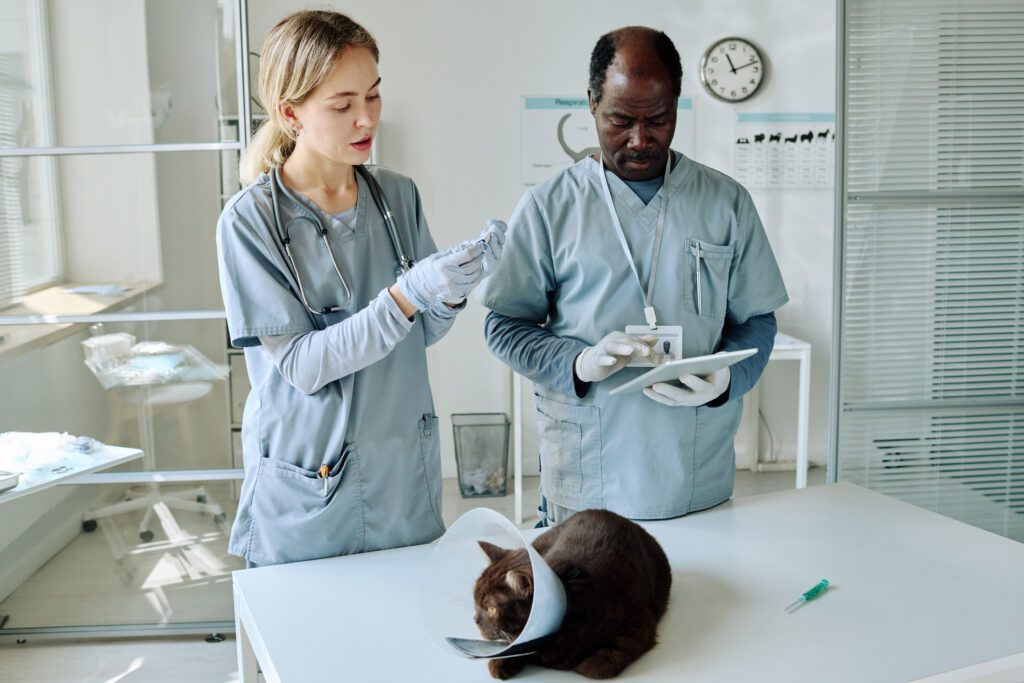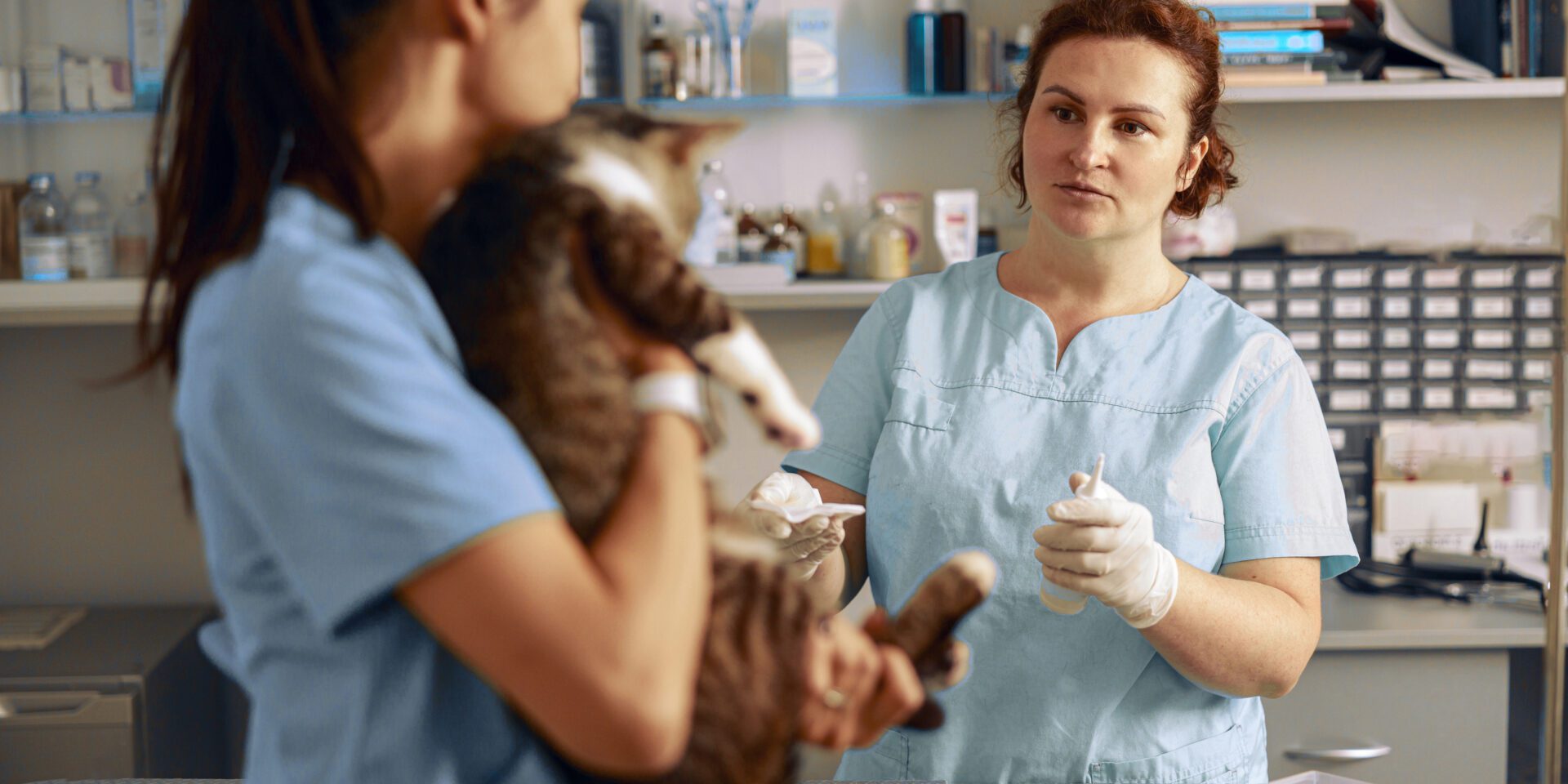It seems like only yesterday that you began vet school, and now, with graduation around the corner, it’s time to secure your first job as a new veterinary graduate. Preparing a list of questions for your first job interview in the veterinary field is crucial.
As a fresh graduate, finding a position that matches your preferences is essential. Remember, an interview is a two-way street where you choose the right role for your first step in the veterinary profession. Employers also have specific expectations from new graduates, so it’s vital to ensure that their practice suits you well.
Preparing for a veterinary job interview can be daunting, especially if it’s for a role you’re passionate about. However, adequate preparation is key to success in this process. Here are some tips on how best to prepare for your upcoming interview:
Conduct thorough research on the veterinary practice to excel in your interview.
Start by exploring the practice’s online presence to familiarise yourself with the clinic’s background, culture, and the team you may join.
Tips for researching a veterinary practice:
- Dive into their online presence: Start by visiting their website and social media pages. This will help you understand their goals, values, and recent activities. Review their blog, latest news updates, or any posts that highlight their priorities and activities.
- Learn about the team: Explore the profiles of veterinarians and staff members on platforms like LinkedIn. Understanding their expertise and backgrounds will help you assess how the team collaborates.
- Client feedback: Look for reviews from clients on platforms like Google and the clinic’s website. This feedback can provide valuable insights into the clinic’s reputation and client satisfaction. It’s important to know if patients feel well cared for by the clinic. You’ll want to join a team that prioritises compassionate and professional patient care.
Here are some tips for preparing for your job interview:
- Practising your answers to potential interview questions out loud can feel awkward, but it helps increase your confidence and clarify your responses.
- Conduct mock interviews, possibly in front of a mirror, to refine your responses, facial expressions, tone of voice, and body language. This practice will help you express your thoughts more effectively and boost your confidence.
- When answering questions during the interview, connect your experiences and strengths with the organisation’s values and goals.
- Use the STAR method when responding to behavioural questions. Describe the Situation, Task, Action taken, and Result achieved. This approach helps maintain clarity in storytelling and showcases your problem-solving abilities.
As you prepare for the interview, it’s important to maintain a positive and confident attitude. Remember that reciting answers word for word is not the goal; authenticity and poise are crucial during interviews. While it’s essential to research thoroughly and rehearse responses, avoid becoming too fixated on perfection that you lose sight of showcasing your unique personality naturally.
For new graduates seeking veterinary positions: To leave a lasting impression during an interview, be sure to have insightful questions ready for the interviewer. This demonstrates your proactive and engaged approach, setting you apart from others. To assist you in preparing, here are ten questions you can ask during an interview:

How does a typical workday unfold?
Asking this question provides a clearer picture of what your daily routine might entail.
Examples of inquiries you could make include:
- Can you outline a typical day or week in this role?
- How is the workload divided among the veterinary team?
- Understanding the work-life balance within the practice.
- Establishing realistic expectations regarding workload and responsibilities.
- Assessing if the clinic aligns with your values culturally.
Could you provide insight into the team I will be collaborating with? The individuals we work with often play a significant role in our job satisfaction. Understanding the team dynamics is essential for gauging how well suited you are for the position. By asking about the team, you can gain valuable insights into their personalities and working dynamics.
What kind of support is available, and what opportunities exist for personal growth and development? Starting your career journey as a recent graduate opens up a world of opportunities for you. Your curiosity about future professional prospects shows that you are forward-thinking, dedicated, proactive, and focused on growth.
Inquiring about the support available is crucial. Here are some examples of questions you could ask:
- Will I have extra time for consultations at the beginning?
- What assistance can I expect with surgeries?
- Are there resources available if I need guidance on a case?
- How will I be supported during out-of-hours shifts? Is there someone I can reach out to for help?
- Will there be any periods where I’ll be in charge independently?
Another important question to consider is how emergency cases are handled. This inquiry will give you valuable insights into the industry and the practice itself.
Understanding their emergency protocols and preparedness is essential since emergencies are common in clinics and practices. Working in a well-prepared and secure environment is key.
Lastly, it’s beneficial to inquire about the client demographics and typical cases dealt with by the practice. This knowledge will give you an idea of the animals and cases you’re likely to encounter frequently. Are the patients mostly small animals and pets, or do you work in a rural setting dealing with farms and large animals?
How do you determine success in this position?
Understanding the key performance indicators (KPIs) for your role would be helpful. Transitioning from school to the workforce can be daunting. In school, you were accustomed to receiving feedback through grades, but such a structured system is not present in the workplace. Hence, knowing what is expected of you right from the start is crucial.
What are the most demanding aspects of this job?
Each individual faces workplace challenges differently. Asking this question can provide you with a realistic view of the role and offer insights into the employer’s pain points. It allows you to discuss how you handle stressful situations and suggest ways to address any issues.
How does the practice facilitate ongoing education?
As a recent graduate starting your first veterinary job, it’s beneficial to seek clinics that provide mentorship programs, regular workshops, seminars, and opportunities for continuous education. Continuous learning plays a vital role in the field of veterinary medicine, where ongoing advancements in research, technology, and best practices are constantly evolving. Progressive veterinary clinics and practices place a strong emphasis on fostering employee development.
What guiding principles does the practice uphold?
Given your thorough understanding of the practice, you might consider tailoring this question to be more specific. For instance, if you’ve identified the core values as X, Y, and Z, how do these principles influence your daily responsibilities?
By taking this approach, you not only demonstrate your preparedness for the interview but also provide the interviewer with an opportunity to share their insights. It’s important to observe how effectively the clinic integrates its values and mission into its operations.
Could you shed light on how the practice maintains a healthy work-life balance?
It’s widely recognized that many veterinarians face significant challenges like burnout, with mental health being a prominent topic of discussion. As you explore job opportunities and seek an ideal fit for yourself, it’s crucial to seek out workplaces that prioritise employee well-being and work-life harmony.
What to expect in a veterinary job interview
In addition to addressing standard questions, be prepared for technical inquiries related to your veterinary expertise and practical skills. You should also be ready to discuss your communication proficiency along with experiences in client interactions and interpersonal relations. When you take the time to research and practice your responses, you’ll be well prepared for the interview.
Here are some additional pointers on what to expect during a veterinary job interview:
- Technical inquiries; Get ready for questions related to your veterinary expertise, technical abilities, and professional background. This might involve conversations about vaccinations, surgical procedures, spaying and neutering, and overall medical care.
- Client interaction and interpersonal skills; Besides clinical and technical skills, soft skills play a crucial role too. Since veterinary roles involve interacting with clients, be ready to talk about how you communicate with pet owners, manage your time efficiently, explain medical conditions clearly, and handle challenging situations like discussing euthanasia with compassion.
- Facility tour or observation; You might get a tour of the facility or the chance to observe daily operations. Take this opportunity to ask questions and gain a better understanding of the work environment.
Remember not to overlook the significance of sending a thank you email after the interview as a gesture of appreciation for the opportunity presented.
As you embark on this exciting journey, recall all the dedication and hard work that have led you to this point. Show your enthusiasm for the field of veterinary medicine and you’ll be one step closer to landing your ideal job.
If you would like to chat to us about your graduate job search please give our friendly Vet Team a call on 01423 813453 or email [email protected]
They can happily talk you through your current role and help you navigate your next steps to reach your career goals – alternatively you can look at the current vet role vacancies by clicking here

